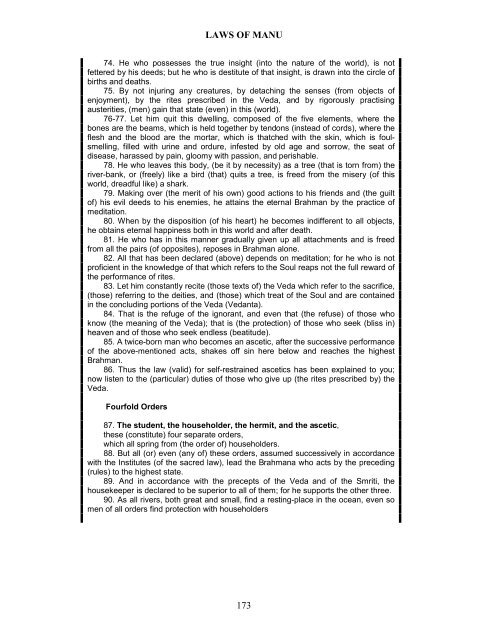Create successful ePaper yourself
Turn your PDF publications into a flip-book with our unique Google optimized e-Paper software.
LAWS OF MANU<br />
74. He who possesses the true insight (into the nature of the world), is not<br />
fettered by his deeds; but he who is destitute of that insight, is drawn into the circle of<br />
births and deaths.<br />
75. By not injuring any creatures, by detaching the senses (from objects of<br />
enjoyment), by the rites prescribed in the Veda, and by rigorously practising<br />
austerities, (men) gain that state (even) in this (world).<br />
76-77. Let him quit this dwelling, composed of the five elements, where the<br />
bones are the beams, which is held together by tendons (instead of cords), where the<br />
flesh and the blood are the mortar, which is thatched with the skin, which is foulsmelling,<br />
filled with urine and ordure, infested by old age and sorrow, the seat of<br />
disease, harassed by pain, gloomy with passion, and perishable.<br />
78. He who leaves this body, (be it by necessity) as a tree (that is torn from) the<br />
river-bank, or (freely) like a bird (that) quits a tree, is freed from the misery (of this<br />
world, dreadful like) a shark.<br />
79. Making over (the merit of his own) good actions to his friends and (the guilt<br />
of) his evil deeds to his enemies, he attains the eternal Brahman by the practice of<br />
meditation.<br />
80. When by the disposition (of his heart) he becomes indifferent to all objects,<br />
he obtains eternal happiness both in this world and after death.<br />
81. He who has in this manner gradually given up all attachments and is freed<br />
from all the pairs (of opposites), reposes in Brahman alone.<br />
82. All that has been declared (above) depends on meditation; for he who is not<br />
proficient in the knowledge of that which refers to the Soul reaps not the full reward of<br />
the performance of rites.<br />
83. Let him constantly recite (those texts of) the Veda which refer to the sacrifice,<br />
(those) referring to the deities, and (those) which treat of the Soul and are contained<br />
in the concluding portions of the Veda (Vedanta).<br />
84. That is the refuge of the ignorant, and even that (the refuse) of those who<br />
know (the meaning of the Veda); that is (the protection) of those who seek (bliss in)<br />
heaven and of those who seek endless (beatitude).<br />
85. A twice-born man who becomes an ascetic, after the successive performance<br />
of the above-mentioned acts, shakes off sin here below and reaches the highest<br />
Brahman.<br />
86. Thus the law (valid) for self-restrained ascetics has been explained to you;<br />
now listen to the (particular) duties of those who give up (the rites prescribed by) the<br />
Veda.<br />
Fourfold Orders<br />
87. The student, the householder, the hermit, and the ascetic,<br />
these (constitute) four separate orders,<br />
which all spring from (the order of) householders.<br />
88. But all (or) even (any of) these orders, assumed successively in accordance<br />
with the Institutes (of the sacred law), lead the Brahmana who acts by the preceding<br />
(rules) to the highest state.<br />
89. And in accordance with the precepts of the Veda and of the Smriti, the<br />
housekeeper is declared to be superior to all of them; for he supports the other three.<br />
90. As all rivers, both great and small, find a resting-place in the ocean, even so<br />
men of all orders find protection with householders<br />
173


















